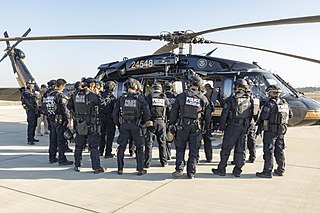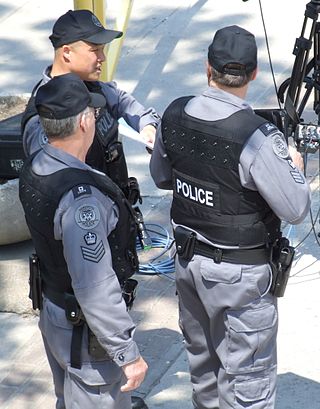
In the United States, a SWAT team is a generic term for a police tactical unit.

The Hostage Rescue Team (HRT) is the Federal Bureau of Investigation's (FBI) elite tactical unit. The HRT was formed to provide a full-time federal law enforcement tactical capability to respond to major terrorist incidents throughout the United States. Today, the HRT performs a number of tactical law enforcement and national security functions in high-risk environments and conditions and has deployed overseas, including with military Joint Special Operations Command units.
The Critical Incident Response Group (CIRG) is a division of the Criminal, Cyber, Response, and Services Branch of the United States Federal Bureau of Investigation. CIRG enables the FBI to rapidly respond to, and effectively manage, special crisis incidents in the United States.
The Behavioral Analysis Unit (BAU) is a department of the Federal Bureau of Investigation's National Center for the Analysis of Violent Crime (NCAVC) that uses behavioral analysts to assist in criminal investigations. The mission of the NCAVC and the BAU is to provide behavioral based investigative and/or operational support by applying case experience, research, and training to complex and time-sensitive crimes, typically involving acts or threats of violence.

The Emergency Task Force (ETF) is the tactical unit of the Toronto Police Service. Created in 1965, it is mandated to deal with high risk situations like hostage taking, emotionally disturbed persons, high risk arrests, warrant service, and protection details and crowd control. The Emergency Task Force is also responsible for responding to any terrorist incidents that occur throughout the City of Toronto.

The National Task Force, formerly known as the National Task Force of the Swedish Civilian Police, is a police tactical unit within the National Operations Department of the Swedish Police Authority.

The Special Task Force (STF) is the elite police tactical unit of the South African Police Service (SAPS). The Special Task Force handles high risk operations that fall beyond the scope of classic policing which require specialised skills.
The State Protection Group (SPG) is part of the Counter Terrorism & Special Tactics Command of the New South Wales Police Force and was established in 1991 to deal with extraordinary policing responses. The SPG directly supports police in high-risk incidents such as sieges with specialised tactical, negotiation, intelligence and command-support services. The unit also provides rescue and bomb disposal support, canine policing, and armoury services.

Active shooter is a term used to describe the perpetrator of an ongoing mass shooting. The term is primarily used to characterize shooters who are targeting victims indiscriminately and at a large scale, who oftentimes, will either commit suicide or intend to be killed by police. More generally, an active perpetrator of a mass murder may be referred to as an active killer.

Standoff is an American drama series that premiered on the Fox network on September 5, 2006. Created by Craig Silverstein, the series focused on an FBI Crisis Negotiation Unit whose members negotiated hostage situations and shared relationships. The show was produced by Sesfonstein Productions and 20th Century Fox Television and its executive producers were Craig Silverstein, Tim Story, and Glen Mazzara. A total of 18 episodes were produced and the series completed its original run on July 20, 2007.

The Emergency Response Unit (ERU) is the police tactical unit of the Garda Síochána, Ireland's national police and security service. The unit was a section of the forces' Special Detective Unit (SDU), under the Crime and Security Branch (CSB) until 2017, when the Special Tactics and Operational Command was created to take over its operational duties alongside Armed Support Units.
The Tactics and Rescue Unit (TRU) is the tactical police unit of the Ontario Provincial Police (OPP). It was formed in 1975 in connection with the 1976 Summer Olympics, which had venues in Ontario.
Special Operations Response Teams are a group under the US Federal Bureau of Prisons, or BOP for short, a component of the US Department of Justice (DOJ). The BOP is responsible for maintaining the custody of anyone convicted of committing a federal crime. To achieve this goal, the BOP maintains a number of correctional facilities, which are divided into six regions, throughout the US. These facilities house approximately 211,195 inmates of varying security levels. Facilities are designated as either minimum, medium, maximum, or the most recent addition, super max.
Crisis intervention is a time-limited intervention with a specific psychotherapeutic approach to immediately stabilize those in crisis.

The Behavioral Science Unit (BSU) is the original name of a unit within the Federal Bureau of Investigation's (FBI) Training Division at Quantico, Virginia, formed in response to the rise of sexual assault and homicide in the 1970s. The unit was usurped by the Critical Incident Response Group (CIRG) and renamed the Behavioral Research and Instruction Unit (BRIU) and currently is called the Behavioral Analysis Unit (5) (BAU-5) within the National Center for Analysis of Violent Crime (NCAVC). The BAU-5 currently works on developing research and then using the evidence-based results to provide training and improve consultation in the behavioral sciences—understanding who criminals are, how they think, why they do what they do—for the FBI and law enforcement communities.

Military psychology is a specialization within psychology that applies psychological science to promote the readiness of military members, organizations, and operations. Military psychologists provide support to the military in many ways, including through direct clinical care, consultation to military commanders, teaching others and supporting military training, and through research relevant to military operations and personnel. Military psychology as a field has been growing since the early 20th century, evidence that the demands and needs for psychological clinical and operational application is continuing to grow steadily. There are many stressors associated with military service, including exposure to high-risk training and combat. As such, psychologists are critical support components that assist military leaders in designing appropriate training programs, providing oversight to those programs, and assisting military members as they navigate the challenges of military training and their new lifestyle. Military psychology covers a wide range of fields throughout the military including operational, tactical, and occupational psychology. Gender differences between military-trained personnel who seek mental health assistance have been extensively studied. Specific examples include post traumatic stress disorder (PTSD) associated with combat, or guilt and family/partner difficulties accompanying extended or frequent deployments due to separation. Clinical providers in military psychology are often focused on the treatment of stress, fatigue, and other personal readiness issues. Previous wars such as the Korean war, Vietnam war, and WW 2 provide great insight to the workings and practices of military psychology and how the practices have changed and assisted the military over the years.
The Federal Bureau of Investigation Crisis Negotiation Unit (CNU) is the part of the Operational Support Branch of its Critical Incident Response Group responsible for the FBI's Crisis Negotiation Program. The mission of the CNU is fourfold, consisting of operations, training, research and program management.
The Columbia Police Department (CPD) is the principal law enforcement agency serving the city of Columbia, Missouri in the United States. It protects a metropolitan population of nearly 127,000 with 187 sworn police officers.
The 1973 Brooklyn hostage crisis occurred when four robbers in Brooklyn, New York City, took hostages and engaged in a standoff with the New York City Police Department (NYPD) over the course of 47 hours from January 19 to January 21, 1973. One police officer was killed, and two officers and a perpetrator were injured, all within the first three hours of the incident; there were no further casualties during the standoff.
Harvey Schlossberg was a New York City Police Department (NYPD) officer, Freudian psychoanalyst, and the founder of modern crisis negotiation. He founded the Psychological Services Department in the NYPD, where he pioneered treatment for violence-prone police. In the Handbook of Police Psychology, Schlossberg was called a "father of modern police psychology" for his role in changing the tactics police employed in hostage situations.











